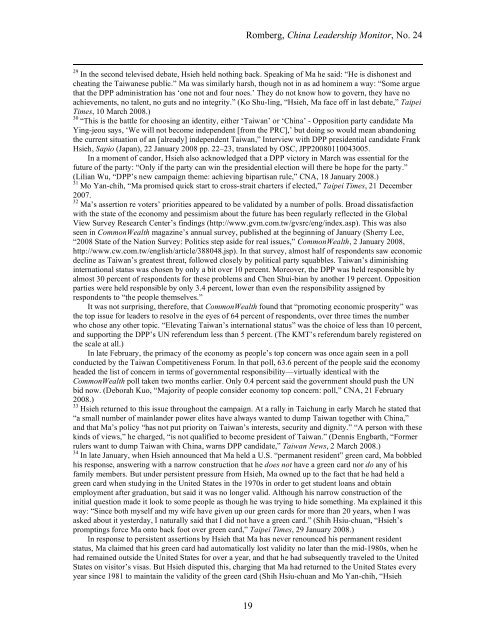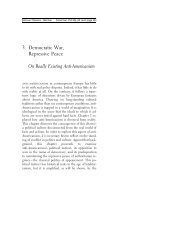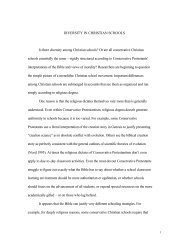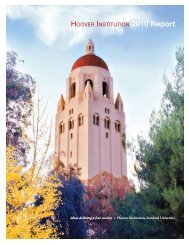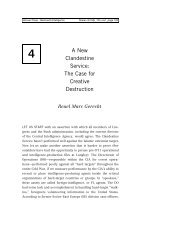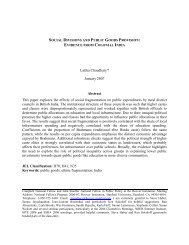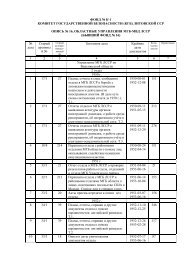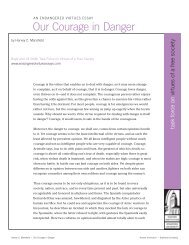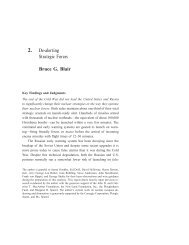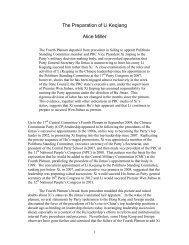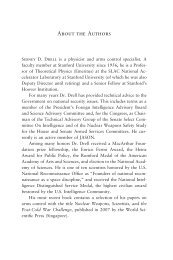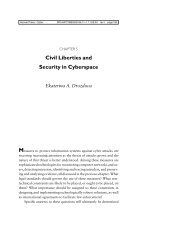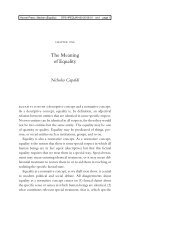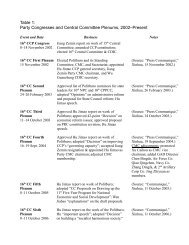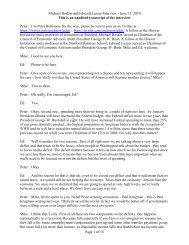Taiwan Elections: Foundation for the Future - Hoover Institution
Taiwan Elections: Foundation for the Future - Hoover Institution
Taiwan Elections: Foundation for the Future - Hoover Institution
You also want an ePaper? Increase the reach of your titles
YUMPU automatically turns print PDFs into web optimized ePapers that Google loves.
Romberg, China Leadership Monitor, No. 24<br />
29<br />
In <strong>the</strong> second televised debate, Hsieh held nothing back. Speaking of Ma he said: “He is dishonest and<br />
cheating <strong>the</strong> <strong>Taiwan</strong>ese public.” Ma was similarly harsh, though not in as ad hominem a way: “Some argue<br />
that <strong>the</strong> DPP administration has ‘one not and four noes.’ They do not know how to govern, <strong>the</strong>y have no<br />
achievements, no talent, no guts and no integrity.” (Ko Shu-ling, “Hsieh, Ma face off in last debate,” Taipei<br />
Times, 10 March 2008.)<br />
30<br />
“This is <strong>the</strong> battle <strong>for</strong> choosing an identity, ei<strong>the</strong>r ‘<strong>Taiwan</strong>’ or ‘China’ - Opposition party candidate Ma<br />
Ying-jeou says, ‘We will not become independent [from <strong>the</strong> PRC],’ but doing so would mean abandoning<br />
<strong>the</strong> current situation of an [already] independent <strong>Taiwan</strong>,” Interview with DPP presidential candidate Frank<br />
Hsieh, Sapio (Japan), 22 January 2008 pp. 22–23, translated by OSC, JPP20080110043005.<br />
In a moment of candor, Hsieh also acknowledged that a DPP victory in March was essential <strong>for</strong> <strong>the</strong><br />
future of <strong>the</strong> party: “Only if <strong>the</strong> party can win <strong>the</strong> presidential election will <strong>the</strong>re be hope <strong>for</strong> <strong>the</strong> party.”<br />
(Lilian Wu, “DPP’s new campaign <strong>the</strong>me: achieving bipartisan rule,” CNA, 18 January 2008.)<br />
31<br />
Mo Yan-chih, “Ma promised quick start to cross-strait charters if elected,” Taipei Times, 21 December<br />
2007.<br />
32<br />
Ma’s assertion re voters’ priorities appeared to be validated by a number of polls. Broad dissatisfaction<br />
with <strong>the</strong> state of <strong>the</strong> economy and pessimism about <strong>the</strong> future has been regularly reflected in <strong>the</strong> Global<br />
View Survey Research Center’s findings (http://www.gvm.com.tw/gvsrc/eng/index.asp). This was also<br />
seen in CommonWealth magazine’s annual survey, published at <strong>the</strong> beginning of January (Sherry Lee,<br />
“2008 State of <strong>the</strong> Nation Survey: Politics step aside <strong>for</strong> real issues,” CommonWealth, 2 January 2008,<br />
http://www.cw.com.tw/english/article/388048.jsp). In that survey, almost half of respondents saw economic<br />
decline as <strong>Taiwan</strong>’s greatest threat, followed closely by political party squabbles. <strong>Taiwan</strong>’s diminishing<br />
international status was chosen by only a bit over 10 percent. Moreover, <strong>the</strong> DPP was held responsible by<br />
almost 30 percent of respondents <strong>for</strong> <strong>the</strong>se problems and Chen Shui-bian by ano<strong>the</strong>r 19 percent. Opposition<br />
parties were held responsible by only 3.4 percent, lower than even <strong>the</strong> responsibility assigned by<br />
respondents to “<strong>the</strong> people <strong>the</strong>mselves.”<br />
It was not surprising, <strong>the</strong>re<strong>for</strong>e, that CommonWealth found that “promoting economic prosperity” was<br />
<strong>the</strong> top issue <strong>for</strong> leaders to resolve in <strong>the</strong> eyes of 64 percent of respondents, over three times <strong>the</strong> number<br />
who chose any o<strong>the</strong>r topic. “Elevating <strong>Taiwan</strong>’s international status” was <strong>the</strong> choice of less than 10 percent,<br />
and supporting <strong>the</strong> DPP’s UN referendum less than 5 percent. (The KMT’s referendum barely registered on<br />
<strong>the</strong> scale at all.)<br />
In late February, <strong>the</strong> primacy of <strong>the</strong> economy as people’s top concern was once again seen in a poll<br />
conducted by <strong>the</strong> <strong>Taiwan</strong> Competitiveness Forum. In that poll, 63.6 percent of <strong>the</strong> people said <strong>the</strong> economy<br />
headed <strong>the</strong> list of concern in terms of governmental responsibility—virtually identical with <strong>the</strong><br />
CommonWealth poll taken two months earlier. Only 0.4 percent said <strong>the</strong> government should push <strong>the</strong> UN<br />
bid now. (Deborah Kuo, “Majority of people consider economy top concern: poll,” CNA, 21 February<br />
2008.)<br />
33<br />
Hsieh returned to this issue throughout <strong>the</strong> campaign. At a rally in Taichung in early March he stated that<br />
“a small number of mainlander power elites have always wanted to dump <strong>Taiwan</strong> toge<strong>the</strong>r with China,”<br />
and that Ma’s policy “has not put priority on <strong>Taiwan</strong>’s interests, security and dignity.” “A person with <strong>the</strong>se<br />
kinds of views,” he charged, “is not qualified to become president of <strong>Taiwan</strong>.” (Dennis Engbarth, “Former<br />
rulers want to dump <strong>Taiwan</strong> with China, warns DPP candidate,” <strong>Taiwan</strong> News, 2 March 2008.)<br />
34<br />
In late January, when Hsieh announced that Ma held a U.S. “permanent resident” green card, Ma bobbled<br />
his response, answering with a narrow construction that he does not have a green card nor do any of his<br />
family members. But under persistent pressure from Hsieh, Ma owned up to <strong>the</strong> fact that he had held a<br />
green card when studying in <strong>the</strong> United States in <strong>the</strong> 1970s in order to get student loans and obtain<br />
employment after graduation, but said it was no longer valid. Although his narrow construction of <strong>the</strong><br />
initial question made it look to some people as though he was trying to hide something. Ma explained it this<br />
way: “Since both myself and my wife have given up our green cards <strong>for</strong> more than 20 years, when I was<br />
asked about it yesterday, I naturally said that I did not have a green card.” (Shih Hsiu-chuan, “Hsieh’s<br />
promptings <strong>for</strong>ce Ma onto back foot over green card,” Taipei Times, 29 January 2008.)<br />
In response to persistent assertions by Hsieh that Ma has never renounced his permanent resident<br />
status, Ma claimed that his green card had automatically lost validity no later than <strong>the</strong> mid-1980s, when he<br />
had remained outside <strong>the</strong> United States <strong>for</strong> over a year, and that he had subsequently traveled to <strong>the</strong> United<br />
States on visitor’s visas. But Hsieh disputed this, charging that Ma had returned to <strong>the</strong> United States every<br />
year since 1981 to maintain <strong>the</strong> validity of <strong>the</strong> green card (Shih Hsiu-chuan and Mo Yan-chih, “Hsieh<br />
19


